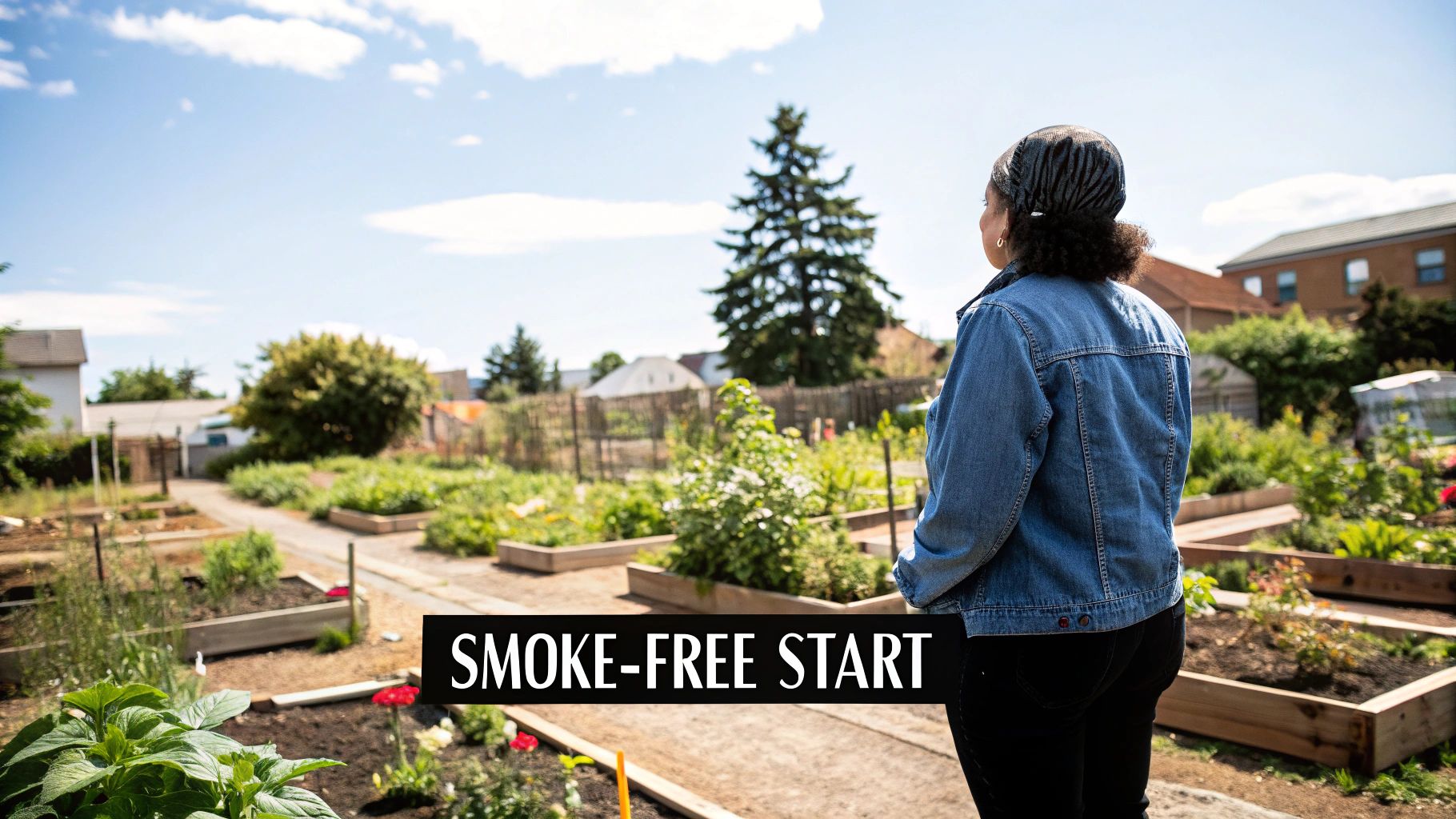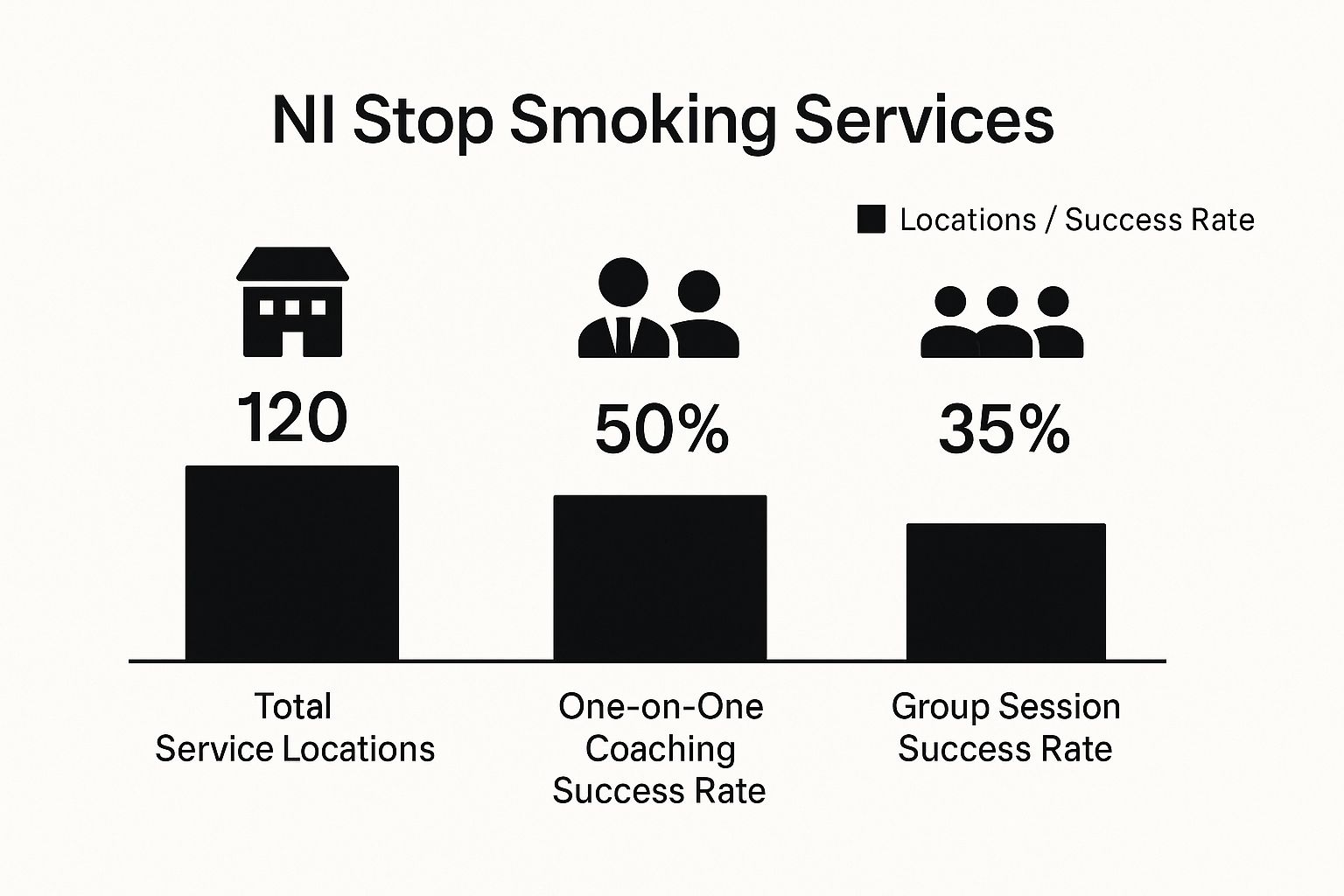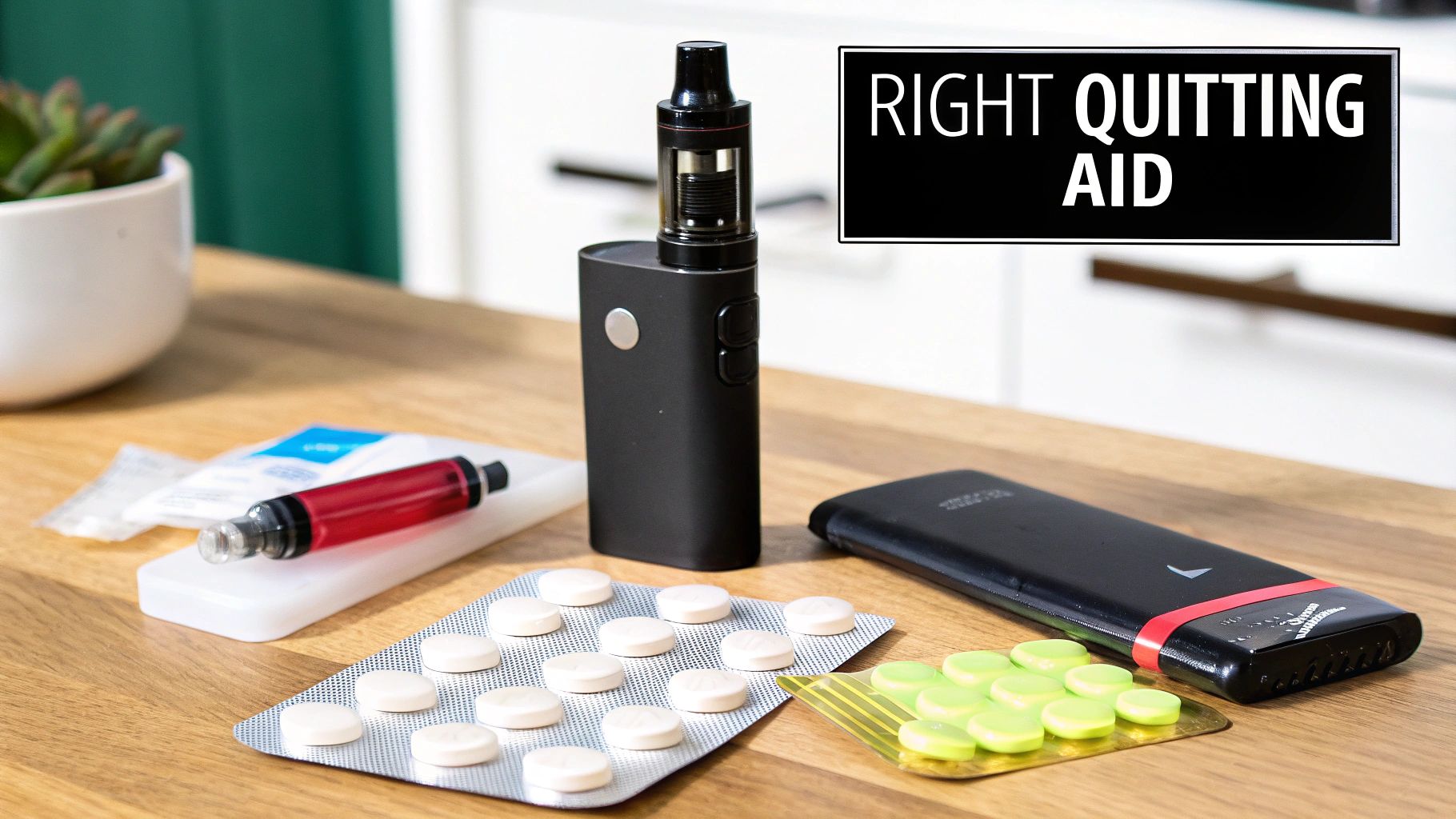If you're looking for smoking cessation NI support, you've probably already realised that quitting isn't just about raw willpower. Real, lasting success comes from a combination of smart strategies, professional advice, and finding the right quitting aids to give yourself the best possible chance.
Starting Your Smoke-Free Journey in NI

Making the decision to stop smoking is genuinely one of the most powerful things you can do for your health. The best part? The benefits aren't years away—they start almost immediately, with tangible improvements you can actually feel within hours and days. It’s a journey of reclaiming your body and your life, and here in Northern Ireland, you’re definitely not on your own.
This isn't just a local trend. Across the UK, smoking rates have plummeted over the last few decades thanks to public health campaigns and a massive shift in social attitudes. Back in 1960, a staggering 51% of adults in the UK smoked. By 2021, that number had dropped to just 14.1%. That's a huge change.
The Immediate Rewards of Quitting
Forget the long-term stats for a minute. Let’s focus on the quick wins that build momentum and keep you motivated. The second you put out your last cigarette, your body gets to work on repairing itself.
- After 20 minutes: Your heart rate and blood pressure start to drop back to normal.
- After 8 hours: The harmful carbon monoxide level in your blood is cut in half, and oxygen levels begin to recover.
- After 48 hours: All the carbon monoxide is flushed out. Your lungs start to clear out mucus and other gunk, and you’ll notice your sense of taste and smell coming back to life.
- After 72 hours: Breathing feels noticeably easier. That's because your bronchial tubes have started to relax.
These rapid changes are incredibly powerful. They're real, physical proof that you're healing, and that can be just the boost you need to get through those first tricky days.
Your Health Recovery Timeline After Quitting
To give you a clearer picture of the amazing recovery process your body goes through, here's a quick look at the milestones you can expect to hit.
| Time After Quitting | Health Improvement |
|---|---|
| 20 Minutes | Heart rate and blood pressure decrease. |
| 8 Hours | Carbon monoxide levels in the blood drop by half. |
| 48 Hours | Lungs begin to clear, and sense of taste and smell improves. |
| 72 Hours | Breathing becomes easier as bronchial tubes relax. |
| 2 Weeks - 3 Months | Circulation improves and lung function increases. |
| 1 - 9 Months | Coughing and shortness of breath decrease. |
| 1 Year | Risk of coronary heart disease is about half that of a smoker. |
| 5 Years | Stroke risk is reduced to that of a non-smoker 5-15 years after quitting. |
| 10 Years | Risk of dying from lung cancer is about half that of a person who is still smoking. |
Seeing these benefits laid out really drives home just how quickly your body thanks you for making this change. Every smoke-free day is a step toward a healthier future.
Understanding the Mental Game
Let's be honest: quitting is as much a mental battle as it is a physical one. Nicotine addiction literally rewires your brain's reward system, creating powerful links between smoking and your daily routines. This is why understanding dopamine addiction can be a game-changer; it helps you see why the habit has such a strong grip.
The most crucial thing to remember is that a slip-up is not a failure. It’s a learning opportunity. Each attempt teaches you more about your personal triggers and strengthens your resolve for the next time—which could be the one that sticks.
The key is to combine your own determination with practical support. Local NI services, coaching, and the right quitting aids all work together to tackle both the physical cravings and the psychological habits. This integrated approach builds a solid foundation, turning what feels like a monumental task into a series of manageable steps. If you want to dive deeper, you can learn more about how to embrace a smoke-free lifestyle in our dedicated article.
Finding Your Local Stop Smoking Service
Trying to quit smoking can feel like a massive mountain to climb, but you absolutely don’t have to go it alone. Across Northern Ireland, there's a fantastic network of free Stop Smoking Services, all designed to give you the expert advice and friendly support that genuinely makes a difference. Tapping into this local resource is one of the best moves you can make.
These services aren’t about getting a lecture or being judged. Think of it more like a confidential partnership with a trained adviser who gets the ins and outs of nicotine addiction. In your first meeting, you’ll just have a relaxed chat about your smoking habits, your lifestyle, and what you’re hoping to achieve. This helps them work with you to create a quit plan that’s actually built for your life.
What to Expect from Your Adviser
Your stop smoking adviser is essentially a personal coach for your quit journey. They’ve seen it all before and bring a ton of experience to the table, helping you get past the common hurdles with strategies that are proven to work.
Your support plan will likely involve things like:
- Picking a Quit Date: Working together to choose a realistic day that gives you time to prepare mentally.
- Spotting Your Triggers: Pinpointing the exact times, places, or feelings that make you automatically reach for a cigarette.
- Building a Coping Toolkit: Brainstorming practical, in-the-moment actions you can take to ride out a craving.
- Weekly Check-ins: Regular, encouraging catch-ups to keep you motivated and celebrate your progress along the way.
This personalised approach is what makes it so effective. The way a social smoker quits is completely different from someone who smokes when they’re stressed. Your adviser helps tailor everything to you.
This infographic gives you a quick look at the success rates and how widely available these services are in NI.

As you can see, while group support is a great option, that tailored, one-on-one coaching often gives people a significant edge.
One-on-One vs Group Support
Most services give you a choice in how you get your support. One-on-one sessions offer a totally private space to talk through your personal challenges. On the other hand, group sessions have the unique benefit of peer support—hearing from others who are in the exact same boat can be incredibly validating.
The evidence for getting this kind of structured help is just too strong to ignore. National reports consistently show that you are about three times more likely to succeed if you use a Local Stop Smoking Service compared to going cold turkey on your own. That single statistic says it all. You can dive deeper into the data in the latest government report on smoking cessation support.
Your local pharmacy is often the quickest and easiest way to get started. Many community pharmacists are trained stop smoking advisers who can get you signed up right away, making it incredibly convenient to begin your journey.
Choosing the Right Quitting Aid for You

Finding the right tool can feel like the biggest decision on your quit journey. And for good reason—it often is. The market is full of options, but really getting to grips with how each one works is the key to picking something that fits your life and your habits. This isn't just about quitting; it's about setting yourself up for success from day one.
For many people, the first port of call is Nicotine Replacement Therapy (NRT). These are the products you’ll see in pharmacies across Northern Ireland, designed to give you a clean, controlled dose of nicotine. The big advantage? You get the nicotine without all the tar, carbon monoxide, and other poisons found in cigarette smoke, which helps take the sharp edge off cravings and withdrawal symptoms.
Understanding NRT Options
NRT isn’t a one-size-fits-all solution. Different products are designed for different types of smokers and habits, which is why a chat with a stop smoking adviser can be so helpful. They’ll often recommend combining two types of NRT to give you the best chance of success.
Here's a quick breakdown:
- Slow-Acting NRT: Think patches. They stick on your skin and deliver a steady, low level of nicotine all day long. They’re brilliant for keeping those background cravings at bay but won't do much for a sudden, intense urge.
- Fast-Acting NRT: This group includes things like gum, lozenges, inhalators, and nasal or mouth sprays. They work quickly to tackle those breakthrough cravings, mimicking the immediate hit you'd get from a cigarette.
A common strategy for a heavier smoker might be using a patch for that constant, all-day support, while keeping a mouth spray handy for those emergency cravings that pop up after a meal or during a stressful phone call. This combination approach is proven to be incredibly effective.
For a deeper dive, have a look at our guide on the best quit smoking aids to see what might click with you.
To help you see how these different options stack up, we've put together a simple comparison table. This gives you a side-by-side look at the most common cessation aids, so you can understand what they do, who they're best for, and what you need to consider.
Comparing Popular Smoking Cessation Aids
| Aid Type | How It Works | Best For | Things to Consider |
|---|---|---|---|
| NRT Patches | Delivers a slow, steady release of nicotine through the skin. | Heavy smokers who need consistent, all-day craving management. | Doesn't address sudden urges or the hand-to-mouth habit. |
| NRT Gum/Lozenges | Provides a quick nicotine hit when chewed or dissolved in the mouth. | People who need fast relief from cravings and want to control their dose. | Can cause jaw ache or indigestion; requires proper "park and chew" technique. |
| Prescription Meds | Alters brain chemistry to reduce smoking pleasure and withdrawal. | Long-term, heavy smokers who haven't succeeded with other methods. | Requires a GP prescription and may have side effects. |
| Vaping (E-cigs) | Delivers nicotine via inhaled vapour, mimicking the act of smoking. | Smokers who miss the physical ritual and want to gradually lower nicotine. | The huge variety of devices and liquids can be overwhelming at first. |
| Behavioural Aids (like AuraFlow) | Provides a nicotine-free tool to satisfy the hand-to-mouth habit. | Individuals focused on breaking the psychological habit of oral fixation. | Doesn't address nicotine addiction directly; often used alongside NRT. |
Ultimately, the "best" aid is the one that feels right for your specific situation and addresses the parts of smoking you find hardest to let go of.
Prescription Medications
Sometimes, NRT just doesn't cut it. In these cases, a GP or stop smoking adviser in Northern Ireland might suggest prescription-only medications like Varenicline (Champix) or Bupropion (Zyban).
These don't contain any nicotine. Instead, they work on your brain chemistry to make smoking less pleasurable while easing withdrawal symptoms. You typically start taking them before your quit date to let them build up in your system. They're a powerful option, especially for those who've tried other methods without any luck.
The key thing to remember is that these medications require a prescription. You'll need a proper consultation with a healthcare professional to make sure they're a safe and suitable choice for you based on your medical history.
Vaping as a Quitting Tool
Vaping has absolutely exploded in popularity as a way to stop smoking, both in NI and across the UK. It's easy to see why. It lets you keep the familiar hand-to-mouth action of smoking while giving you total control over your nicotine intake, which you can then reduce over time.
And it’s not just anecdotal. A major 2023–2024 study involving over 25,000 smokers found that e-cigarettes were used in more than 40% of quit attempts. More importantly, they were linked with the highest success rates compared to every other aid out there.
If you decide to give vaping a go, the best advice is to start simple. A basic starter kit and an e-liquid strength that matches your old smoking habit is all you need. Your local specialist vape shop or stop smoking service can give you tailored advice to make sure you get off on the right foot.
Building Your Personalised Quit Plan

Just saying "I'm going to quit smoking" is a great start, but it's the plan that truly makes it happen. Think of it as your personal roadmap, a guide to navigate those first tricky days and weeks with a bit of confidence rather than just hoping for the best.
The first real step? Pick a quit date. And don't just pluck one out of thin air. Give yourself a few days to get your head in the game. For a lot of people, a Monday feels right—a fresh start to the week. But honestly, any day that feels significant to you will work. Once you've picked it, tell a few people. Saying it out loud makes it feel real and adds a gentle layer of accountability.
Get to Know Your Triggers
With your date in the diary, the real detective work begins. You need to understand why you actually smoke. Most cigarettes aren't a conscious choice; they're a reflex, a habit fired off by something else.
For the next few days, just keep a simple log. Every time you light up, make a quick note of:
- When was it? Are there clear patterns, like first thing in the morning or just before bed?
- Where were you? In the car, on your work break, out in the garden?
- How were you feeling? Stressed, bored, happy, or just having your morning coffee?
This little exercise is surprisingly revealing. You’ll quickly see your personal triggers pop up. Maybe it's that morning coffee that feels empty without a cigarette, or the stress of a deadline that has you reaching for a lighter on autopilot. These are the moments you need a plan for.
Build Your Toolkit for Coping
Now you can get specific. For every trigger, you need an alternative. This isn't about raw willpower; it's about having a new, ready-made action to take instead.
If the morning coffee is a big one, shake up your routine. Have your coffee in a different room for a while, or maybe even switch to tea for the first week just to break the association.
It's a mental game as much as a physical one. You're not losing something; you're gaining control. You're building a new, healthier identity one small choice at a time. It’s all about creating positive routines to crowd out the old ones.
As you map this out, it's worth looking into powerful strategies for breaking old habits and forging a new identity. This really helps you get to grips with the psychological side of the addiction, which is often the toughest nut to crack.
Finally, prepare your space. Before your quit day arrives, do a full sweep. Get rid of every last cigarette, lighter, and ashtray from your home, your car, and your workplace. Leaving them around is just setting yourself up for a moment of weakness. And let your close friends and family know what you're doing. Ask for their support and patience—believe me, having a solid support system makes all the difference.
How to Handle Cravings and Setbacks
Let's get one thing straight: cravings are going to happen. They are a completely normal part of quitting, not a sign that you're failing or that you don't have enough willpower.
Think of them as echoes of an old habit. At first, they're loud and demanding, but over time they become quieter and less frequent. The trick is having a solid plan for when they strike.
When a craving hits, it can feel like it's going to last forever, but the reality is most intense urges pass in just a few minutes. Your only job in that moment is to find a way to ride out that short wave without giving in. This is where a simple, memorable technique can be a real lifesaver.
The Four Ds: Your In-The-Moment Toolkit
One of the most effective strategies I’ve seen people use is the ‘Four Ds’. It's a practical mental checklist you can pull out anywhere, anytime.
- Delay: Just tell yourself you'll wait 10 minutes. It sounds simple, but this small pause is often all it takes for the craving to lose its power and pass on its own.
- Deep Breathe: Take a few slow, deliberate breaths. Inhale for a count of four, hold for a moment, and exhale slowly for a count of six. This instantly calms your nervous system and gives your hands and mouth something to focus on.
- Drink Water: Grab a glass of cold water and sip it slowly. This simple action helps with the hand-to-mouth habit and keeps you hydrated, which can genuinely reduce the intensity of withdrawal symptoms.
- Do Something Else: Distraction is your best friend. Get up and walk into another room, put on your favourite song, or fire off a quick text to a friend. A small change of scenery or focus is brilliant at breaking that mental loop.
If you’re looking for more ideas, having a list of things to do instead of smoking ready to go can be a massive help.
Managing the Mental Game
Quitting smoking isn't just a physical battle; it's a huge mental adjustment. You might find yourself feeling more irritable, anxious, or unable to concentrate, especially in those first few weeks.
This is just your brain recalibrating to life without a constant drip of nicotine. It will get better.
Simple lifestyle tweaks can make a massive difference here. A brisk 15-minute walk can crush a craving and give you a much-needed mood boost. Staying well-hydrated helps flush out toxins and can ease that edgy, anxious feeling. These small, healthy actions are literally rewiring your brain to find rewards in new places.
A slip-up isn't a failure. It's just a piece of data. Use it. Learn what triggered you and figure out how to handle that situation differently next time. The only real failure is giving up on quitting altogether.
What to Do If You Have a Slip-Up
It happens. It happens to so many people on this journey. The most important thing is not to let one cigarette spiral into a full-blown relapse.
Acknowledge what happened, forgive yourself, and get right back on track. Don't wait until tomorrow. Recommit to your goal immediately.
Think about what led to it. Was it a particularly stressful day? A social situation you weren't prepared for? By seeing it as a lesson rather than a catastrophe, you build resilience. Every successful quit journey is built on the lessons learned from the tough moments.
Got Questions About Quitting in NI?
Deciding to quit smoking is a massive step, and it’s completely normal for your head to be buzzing with questions. How does it work? What happens if I slip up? Getting straight answers can make the whole thing feel a lot less scary.
So, let's clear up some of the most common things people ask when they start their smoke-free journey in Northern Ireland. The idea is to cut through the confusion so you can focus on what really counts—quitting for good.
Are Stop Smoking Services in Northern Ireland Really Free?
Yes, they absolutely are. Any Stop Smoking Service you access through the Health and Social Care (HSC) system in Northern Ireland is 100% free of charge.
This isn't just a leaflet and a pat on the back. You get proper one-to-one support and practical advice from a trained stop smoking adviser who knows their stuff. While the support itself is free, you might still have to cover the standard prescription cost for stop-smoking aids like Nicotine Replacement Therapy (NRT). But it's worth checking, as many people are exempt from these charges.
You'll find these services are often based in local community pharmacies, making it super convenient to pop in and get the ball rolling.
What Should I Do If I Have a Slip-Up?
First off, don't beat yourself up. A slip-up is a hiccup, not a failure. It’s an incredibly common part of the process, and the most important thing is not to let one cigarette undo all your hard work.
Take a breath and think about what triggered it. Were you stressed? Out with certain friends? Pinpointing the 'why' helps you build a better defence for next time. The crucial thing is to get right back on track. Don't fall into the "I'll start again on Monday" trap. Your quit journey continues right now.
A lapse is just a lesson in disguise. Get in touch with your stop smoking adviser. They've seen it all before, offer zero judgment, and will help you strengthen your plan.
Is Vaping Better Than Patches or Gum for Quitting?
That's a great question, and honestly, the "best" method often just comes down to what works for you. Respected UK health bodies and research have shown that vaping can be a very effective way to stop smoking. For a lot of people, its success lies in how it mimics the hand-to-mouth action of smoking—a ritual that's often harder to break than the nicotine addiction itself.
Some studies even suggest that for some people, vaping works better than traditional NRT. But here's the real secret sauce: the most successful quit attempts usually pair a product (vape, patch, or gum) with professional support. An adviser helps you use your chosen tool effectively while also helping you tackle the mental side of addiction. It’s the best of both worlds.
How Long Do Withdrawal Symptoms Actually Last?
Everyone's timeline is a little different, but there’s a general pattern you can expect. The toughest physical symptoms—think irritability and intense cravings—usually hit their peak within the first week.
After that initial hump, they start to fade quite a bit over the next two to four weeks. Using something like NRT or a vape can seriously take the edge off during this period, making it far more bearable.
The psychological cravings, the ones tied to habit and routine, can stick around a bit longer. But they become much less frequent and a whole lot easier to manage over time. Simple things like drinking plenty of water and going for a short walk can also make a surprisingly big difference.
Ready to break the psychological habit of smoking for good? AuraFlow offers a nicotine-free, mindful alternative to satisfy the hand-to-mouth ritual with calming, natural flavours. It’s the perfect partner for your smoke-free journey.
Discover the AuraFlow Starter Kit and begin your new chapter today.
